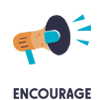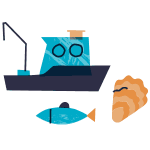During formulation of the fishing agreements, it was established that the negative impact of fishing on nature quality has been reduced. However, this is not the final goal. To achieve fully sustainable shared use (including economic shared use), we need to push developments to a higher level. On behalf of its commissioning parties, PRW will take the next steps in this process.
The 2050 future perspective for the fishing industry is not yet set in stone. Far-reaching change can be achieved by ensuring an economically healthy sector that focuses on fishing away from the seabed as much as possible, with little to no by-catch and with a catch level or intensity that only harvests the ‘surplus’ of the target species. Furthermore, endangered fish species must not be fished. All of the above will require a substantial leap forwards in mindset and technology, a challenge made even greater by the ambition to maintain and reinforce the regional importance of fishing to local communities and economies. With this in mind, the programme is focusing on the following areas:
- A knowledge platform: This will pool all of the knowledge of professionals in the fishing sector and other experts as well as enabling this knowledge to be updated based on the latest information.
- Regional sustainable shared use:Transitions will be required that reinforce the regional economic role played by the fishing industry while simultaneously boosting sustainability in a manner appropriate to the ecological value of the Wadden Sea. Important examples of this include the local trade and processing of Wadden Sea produce, the transition of some fishermen to the recreational, demonstration or sports fishing sector, or involvement in monitoring tasks. In this regard, the ball is in the sector’s court.
- Capitalising on new opportunities relating to aquaculture:Attention to the development of a new silt economy will play a vital role in local policy. Marine aquaculture offers opportunities to maintain and boost the economic position of shellfishing and of shellfish products in the region. Furthermore, seaweed and algae have become an important solution to the global food problem and they create opportunities to boost the sustainable economy. These new production methods in mostly new locations – sometimes inside dikes – could help to limit the impact of the fishing industry on the Wadden Sea during shortages by ensuring continuity of supply and enabling opportunities for far-reaching long-term transition. In this regard too, the ball is in the sector’s court.
- A shared vision:This vision will incorporate coherent spatial policy in protected areas, the impact of the changing climate on the fishing industry and the reduction of waste. Within this framework, attention must be paid to the ambition to achieve knowledge-based management: How can we connect the knowledge within the sector with the knowledge in the region to enable optimal management?
Role of the PRW:



Results to be delivered:
- A platform will be developed in 2020 that will pool all of the knowledge of professionals in the fishing sector and other experts and enable this knowledge to be updated based on the latest information.
- At least two new regional sustainability initiatives will have been fully developed in 2020 together with the parties involved.
- One or two knowledge or pilot projects will have been set up in 2020 to contribute to the development of marine aquaculture.
A vision for the fishing industry will have been fully developed in 2020, which will provide a framework for future action for the parties and government bodies involved.
Commissioning parties:
- Ministry of Agriculture, Nature and Food Quality
- Provinces in the Wadden Sea region: North Holland, Friesland and Groningen
- Natural Wadden Coalition
Follow-up action by:
- Provinces in the Wadden Sea region: North Holland, Friesland and Groningen

